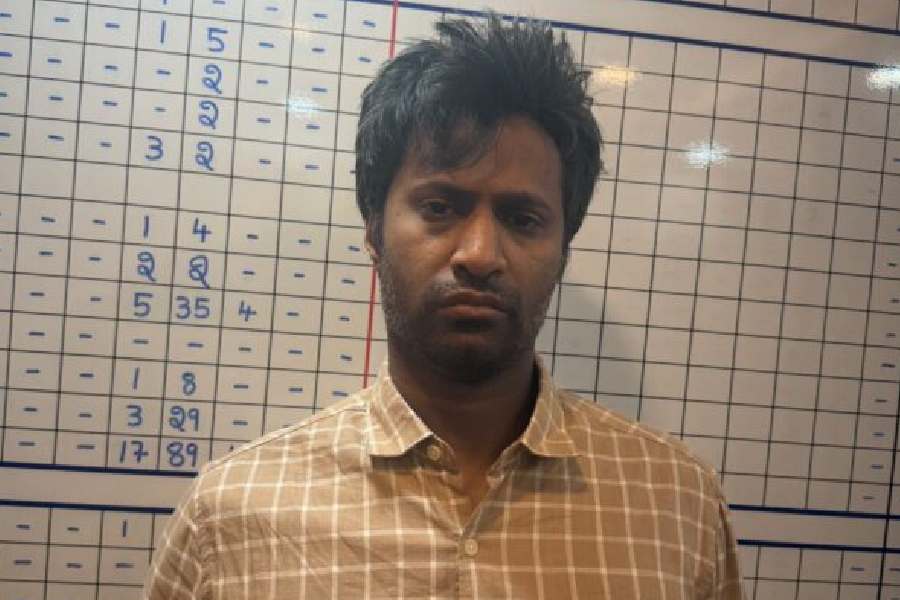New Delhi, Jan. 20: Lawyers today criticised Arvind Kejriwal’s street protest as “unconstitutional and illegal” and warned of a serious threat to the country’s federal structure if the chief minister were allowed to have his way.
One veteran advocate said he would move the Supreme Court tomorrow for “appropriate directions” against the Aam Aadmi Party leader while a former judge rued that he had “wasted his vote” on the rookie party.
Another prominent lawyer said Kejriwal was trying to undo what the top court has been trying to do — “unshackle” police from political control.
The barrage of criticism followed the Delhi chief minister’s dharna to press for the suspension of some police officers, who had refused to follow the orders of two ministers in separate cases.
Former Delhi High Court judge R.S. Sodhi said Kejriwal was trying to invite President’s rule as a “face-saving” tactic, echoing a view that the dharna was a ruse to force the UPA’s hand and test the waters for freeing himself up for the upcoming Lok Sabha elections.
“This man (Kejriwal) has no power to force the central government to suspend the policemen. It is a departmental matter. If he has a complaint, he should bring it to the notice of the department concerned,” Sodhi told The Telegraph.
Delhi police report to the Union home ministry, not the state government.
“The chief minister going on dharna in support of his illegal demand is a violation of the federal structure. Whenever there is a breakdown of the constitutional machinery, the President can direct imposition of President’s rule,” Sodhi said.
“The AAP wants that because they know they are not able to rule any more. The entire thing is being enacted as a face-saving device to ensure that the government is dismissed so that he can emerge as a martyr in the eyes of the gullible public…. I am ashamed that I wasted my vote on the AAP. I voted for the party and it is my biggest mistake in life.”
Supreme Court advocate Firasath Ali Khan said last week’s events — that included a late-night raid on some African women by a mob on the suspicion of illicit activities — was an ominous sign of “mobocracy”.
Police officers had refused to follow law minster Somnath Bharti’s orders to raid the house where the women were said to have been staying, saying they didn’t have a search warrant.
The other altercation involving Rakhi Birla, the women and child minister, and a west Delhi station house officer was over the refusal to register the complaint of an alleged dowry victim.
“Tomorrow, if Prime Minister Manmohan Singh asks Kejriwal to suspend any official of the Delhi government, will Kejriwal do it?” Khan asked.
Advocate Manohar Lal Sharma, who had filed a public interest petition in the coal controversy, said he would move the Supreme Court tomorrow for “appropriate directions” against Kejriwal and, if necessary, a directive for President’s rule in Delhi.
Prominent criminal lawyer K.T.S. Tulsi said Kejriwal was trying to undo what the Supreme Court has been doing.
“For over a quarter of a century, the Supreme Court has been trying to free the police and the CBI from the shackles of the political class…. It had passed orders for setting up police recruitment boards in the Prakash Singh case to free the police machinery from political influence.
“It did the same thing in the coal scandal by asking the government to give autonomy to the CBI.
“What Mr Kejriwal is doing is the opposite. Now he wants to have direct control over the police and interfere with the administration of the police machinery. It is highly unconstitutional and a flagrant violation of CrPC provisions.”
According to the lawyer, no political leader had the power to interfere with the functioning of the police. “Police must remain independent of political influence. They are the servants of law and not of any political leadership,” Tulsi said.
Another counsel, R.K. Kapoor, said the Delhi government had no power to tell the Centre to suspend the police officers. “As far as compelling a central government or a state government (is concerned), there is a complete separation of powers under the Constitution, particularly where three separate lists have been provided, clearly earmarking the fields of legislation in the Seventh Schedule… under the Union, state and concurrent list.
“Individual officials are governed by their respective service rules. They can be suspended only according to the rules and not on the mere directive of a political executive. Otherwise, there will be no rule of law in the country. There will be total anarchy in the country, which is what would happen if we allow such political diktats,” Kapoor warned.











